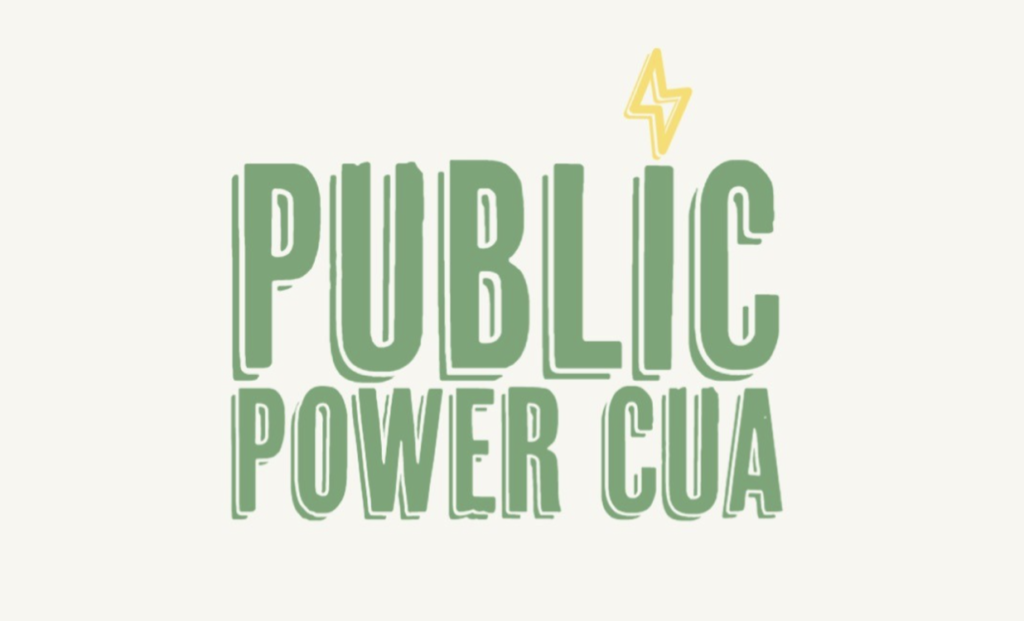Students Advocate for Public Power in D.C.

Image Courtesy of Public Power CUA
By Mariah Solis
While taking an environmental politics and policy course at the Catholic University of America (CUA), Junior musical theater major Benjamin Campion and junior politics majors Sara Mosley and Jack Kruger took it upon themselves to inform the student population about renewable energy through public power as opposed to privately owned utilities.
“We’re not officially recognized by the school,” said Campion. “We don’t get money from OCA. But we are a group of students working on campus using our resources of the campus.”
“There’s already a movement for public power in D.C. as a whole, and our main goal is really to draw attention to it on campus and build support for it,” said Kruger.
The group launched their Instagram account for Public Power CUA on March 20th, with part of their caption stating, “Our current mission is to support groups such as We Power DC to advocate for DC residents and their battle against the energy monopoly: Pepco. Pepco has been unjustly raising electric bills for DC residents and it’s time to take a stand.”
They then began posting infographics regularly, reaching out to government officials, and planning events for students to attend on campus. Such events included an informational meeting about public power and watching a documentary about the Sunrise Movement, which consists of young people advocating for the Green New Deal and climate justice.
“With We Power D.C., it’s not really a new issue, but I feel like it’s still in the starting stages of their advocacy, so spreading information, transparency, and informational politics is really important,” said Mosely.
“It’s a human right to have power, like if you don’t have heat and cooling, that’s a problem,” Campion said. “It would make sense to make it something provided by the government because people shouldn’t necessarily be making a profit off that, especially when it’s been proven that when they are making a profit off it, they are not providing a good service.”
The group also tabled inside the Pryz to encourage students to sign a public power pledge and attend a “Walking Tour of Plutocratic D.C.,” which aimed at exploring Carlyle Group, Pepco, and City Center D.C.
They shared posts about the walking tour, talking about how it discussed Pepco being an example of “rentier capitalism,” stating that the company “overcharges our neighbors, flaunts DC sustainability goals, and fights a move towards greener energy supplies for DC.”
Campion shared how this opportunity to discuss public power and environmental policies has been a rewarding and beneficial experience for him.
“When you’re working with a movement, it’s not just volunteering and doing service, but you’re also gaining a community and it can be fun,” said Campion. “It can be really nice to be a part of a group of people fighting for the same thing and who kind of grasped and feel the stakes the same way.”
According to VeryWell Health, roughly 83% of Gen Z’s mental health has been affected by environmental concerns, which is often categorized as “eco-anxiety.” Campion shared how taking part in concrete action has helped alleviate this stress.
“Anxiety and depression have sky-rocketed in our generation due to climate change because we know that our futures are actively being destroyed right now, and we can kind of feel hopeless, and feel like either, ‘I need to do everything right now,’ or you feel like you can’t do anything,” said Campion. “You can’t just full-time work on a movement, so this idea of joining a group that can provide support, joy, and hope, and direct means of action is good.”
Kruger shared similar sentiments, stating, “A lot of environmental activism can seem very nebulous, and I think a lot of people are focused on the fact that global solutions are required, which they are, but I think that there are also a lot of things to do right here in D.C.”
Kruger mentioned how he has also been participating in an online Public Power reading group this semester and hopes that more CUA students seek information about public power in similar ways.
“I didn’t know anything about power grids before I joined the reading group, and I think it’s been really instructive and kind of been educating myself on that,” said Kruger.
Mosley also emphasized how she hopes students continue to educate themselves and share information with others.
“I think educating ourselves first about the issue and then going from there because you can’t really start actively doing something before you’re educated,” said Mosley.
All three students are active E-Board members and participants in Progressive Student Union (PSU), a political student organization on campus, and shared how they hope to continue advocating for public power and environmental policies through PSU.
“As the president, after this group project is done, I’m hoping this can continue,” said Kruger. “I haven’t spoken to anybody about this yet, but I’m hoping to make it like a campaign arm for the Progressive Student Union, and hopefully tying that in.”
For more information and to hear about future events, visit @publicpowerdc on Instagram.







